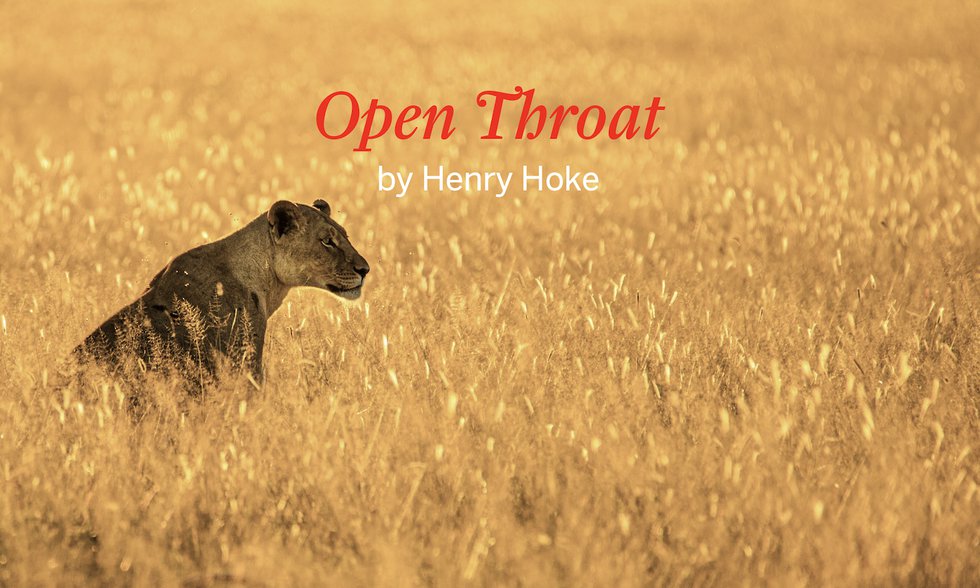Something to chew on…

Open Throat by Henry Hoke. MCD. pp. 176. $25
From Animal Farm and Watership Down to the Warriors and Red Wall series, “animal literature” is its own class of interesting and just plain bizarre. And we aren’t talking cheerful, little Peter Rabbit here either. Whether it’s murder or bunny totalitarianism (and all the horrid things that stem from that), there’s some R-rated stuff that goes on. Adding to this genre, Virginia-born author Henry Hoke takes a running leap and pounces on his unsuspecting—but delighted—readers with Open Throat. Following a queer mountain lion (i.e. puma, cougar) in Los Angeles, we step into a world of dust and tears, hunger and hunting.
Open Throat’s nameless narrator has the attitude of a reluctant teenager. He’s primed for danger and rebellion but isn’t quite ready to touch the lit match to the leaf pile. Instead, he stalks and eavesdrops on the various passersby who trek the trails near the city. We first meet him lying low, listening to three people—one a large man with a whip. Most times, the dialogue he hears acts as a sort of radio or television, informing the reader what the lion cannot understand or know—like current events.
From the beginning, we know this isn’t going to be a normal reading experience. Channeling modernists like James Joyce but also contemporaries like Max Porter, the style doesn’t use punctuation and is broken, clipped into short lines sharing similarities with the poetic form. Instead of being difficult (hear me out!), it makes the reading experience exciting. It’s certainly not as indecipherable as Joyce, but it does play with language a bit when our cougar swaps “ellay” for L.A. and other words.
Throughout all these hot days, we get some background information on the lion, his fraught family life. The big cat kingdom certainly seems more oedipal than the human one—Freud grinning from his tobacco-stinking, leather armchair. It is also in these moments of retrospect and reminiscence that his queer identity is alluded to. When he is chased by his malicious, territorial father (imagine something from the scary bits in The Lion King), he is forced from his home. And while in search of his next meal, he meets another young male and shares a deer. Though nothing untoward or sexual is mentioned happening between the two, the longing in the narrator’s words as he describes the event is rather suggestive. However, other than that scene and a current-day scene where our cougar sees two men “having a good time”—vaguely excited by it himself—there really isn’t much evidence that he’s non-heteronormative.
Well…that’s not quite true.
After some arson (the human-created kind), our cougar flees his hillside home. Exploring closer to the city, he gets up close and personal with not only a carousel but a zoo. This may stick out to other observant readers. Both the animals, mental and flesh, are trapped in a circular routine of sorts. Perhaps this is a commentary, on Hoke’s part, of the notion and societal/cultural purpose of a zoo. But this scene—like many others in this slim book—is quick, and our cougar escapes a few pages later. Or does he?
Weaving his way about town, he comes to the house of the wealthy Slaughter family (“like something I could do / like somewhere I belong”). There the Slaughter daughter decides he’s just an oversized house pet. (One really wonders if she’s just stupid or similarly going through her rebellious phase—there’s talk that her father has remarried a much younger woman.) But while staying at this deluxe accommodation, our cougar’s been named at last, Heckit, a girl’s name, but he doesn’t seem miffed. Is this because he’s sort of gender-fluid? The mind goes spinning with the possibilities.
Hoke has a firm hand on the writing style and the voice. Yet, for all the excitement of being in the head of a cougar, he could have dived further still. Watership Down is a longish book, and it suffers from too many “rabbit fairy tales” about the trickster El-ahrairah, but it also keeps the reader invested. Open Throat is very modern in the way that it is short and sweet (think Fever Dream by Samanta Schweblin, Ghost Wall by Sarah Moss, or The Only Story by Julian Barnes). Yet that leaves room for an accusation of being hollow or shallow. The only reason for feeling this way, though, is the belief that the resolution wasn’t satisfying or was rushed, leaving things unresolved. But it’s a vivid and exciting ride for the most part, and readers will surely remember the strange, sad cougar who got his revenge.
Sidebar: Animal Lit
The Bees by Laline Paull
The Plague Dogs by Richard Adams
I Am Cat by Natsume Soseki
Fox 8 by George Saunders
Perestroika in Paris by Jane Smiley
The Evolution of Bruno Littlemore by Benjamin Hale
The Hen Who Dreamed She Could Fly by Hwang Seon-mi
Memoirs of a Polar Bear by Yoko Tawada
Fire is Your Water by Jim Minick
Hollow Kingdom by Kira Jane Buxton
Get a copy at The Bookshop.









